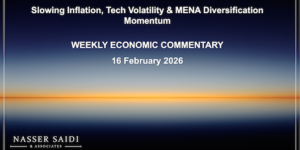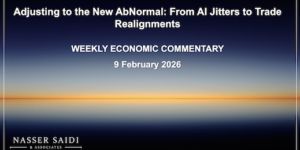Markets
Wall Street until mid week suffered a 5 day losing streak, then on Thur it staged a rebound led by tech and energy shares. Equities also jumped after US President Donald Trump stated that China “wants to make a deal” on trade, but not enough for indices to record a weekly gain. European and Japanese equities had another bad week as the GDP data came out much below expectations and the new drama in the Brexit saga irked investors. In contrast, emerging markets performed well on the back of a positive mood in China. Regional markets were mixed as the oil price weakness remains in focus. In currency markets the GBP took a blow due to the political uncertainty over the Brexit treaty, while the euro managed a small rebound after two weeks of decline. Oil prices stabilized despite another unexpected large buildup in US crude stockpiles, while gold prices remained confined in a narrow range above USD 1200/ounce.
Global Developments
US/Americas:
- US inflation was 0.3% mom (2.5% yoy) in Oct after 0.1% in Sep (2.3% yoy) due to a spike in energy prices. Core inflation was 2.1% yoy marginally lower than 2.2% in Sep.
- US industrial production advanced 0.1% in Oct vs 0.2% in Sep. Manufacturing gained 0.3%, while mining fell -0.3% mom and utilities -0.5%.
- US retail sales soared by 0.8% mom in Oct vs a -0.1% decline in Sep. Fuel sales surged 3.5% mom.
- US initial claims for unemployment benefits rose by 2,000 to 216,000. The 4-week moving average also ticked up by 1,500 to 215,250. Continuing claims jumped by 46,000 to 1.676 mn and the 4-week moving average increased by 8,750 to 1.643 mn.
- Argentina’s inflation hit 45.9% in Oct, a top since mid-2016, due to the depreciation of the peso, higher tariff for regulated services and soaring food prices.
Europe:
- The eurozone’s trade surplus shrunk to EUR 13.1bn in Sep, from EUR 25.3bn a year earlier. Imports went up 6.4% yoy, while exports declined -1%. Imports were rather strong over the summer despite anaemic economic growth.
- The eurozone’s industrial production slid -0.3% mom (0.9% yoy) in Sep, partially reversing a 1.1% jump in Aug (1.1% yoy). The contraction involved all major sectors especially those producing capital goods and was severe in automotive.
- Germany’s real GDP fell -0.2% qoq (1.1% yoy) in Q3 vs 0.5% (2.0% yoy) in Q2. It was the first quarterly contraction since Q1 2015 due to a drop in both exports and private consumption.
- The ZEW Indicator of Economic Sentiment for Germany rose by 0.6 pts mom to -24.1 in Nov. still in negative territory as industrial production, retail sales and foreign trade disappointed.
- Germany’s inflation accelerated to 2.5% yoy in Oct from 2.3% in Sep due to energy prices, which also boosted utilities and transportation inflation.
- UK inflation was unchanged at 2.4% in Oct. Lower food and core goods inflation offset an increase in electricity and fuel prices.
- UK retail sales in Sep grew by 2.2% yoy (-0.5%yoy) vs in Oct 3.3% (-0.4% mom). The monthly decline resulted mainly from a drop non food sales.
- The UK prime minister May reached a tentative agreement with the EU Commission on a Brexit treaty. However a number of ministers and government aides resigned in protest.
Asia Pacific:
- Japan’s real GDP contracted -0.3% qoq (-1.2% yoy) in Q3 after a 0.8% (3.0% yoy) surge in Q2. The decline was driven by a -0.1% qoq drop in private consumption, while exports declined by -1.8% qoq and investments by -0.2%.
- China’s industrial production growth was 5.9% yoy in Oct, vs 5.8% in Sep, thanks to a 12.4% yoy jump in high-tech output, 7.7% in food manufacturing, 10.1% in ferrous metal, and a 13.2% in cement. Nevertheless, industrial production growth remains weak compared to recent years.
- China’s fixed asset investments increased by 5.7% yoy in Oct vs 5.4% in Sep led by the private sector, while public investment growth lagged. This figure is the first sign that investment activity might be rebounding in response to credit expansion.
- China’s retail sales rose 8.6% yoy in Oct, vs 9.2% in Sep. Automobile sales fell -6.4% yoy, the sixth consecutive month of decline.
- India’s industrial production rose just 4.5% yoy in Sep, down from Aug’s 4.7%. Manufacturing output had been firm in recent months thanks to a broad-based recovery following the demonetisation shock in early 2017.
- India’s inflation slowed to 3.3% yoy in Oct from 3.7% in Sep — marking the third month below the RBI’s 4% target — thanks to subdued food and fuel inflation.
- India’s trade deficit rose to USD 17.1bn in Oct, vs USD 14bn in Sep.
- Hong Kong’s real GDP rose just 0.1% qoq (2.9% yoy) in Q3, after a -0.2% fall (3.5% yoy) in Q2. A surge in imports offset a solid performance in exports and private consumption.
- Malaysia’s GDP expanded by 4.4% yoy in Q3, just a decimal below the pace in Q2.
- Singapore’s non-oil exports advanced in Oct by 8.3% yoy, almost similar to the 8.1% recorded in Sep.
- The Bank of Indonesia hiked its repo rate by 25bp to 6%. The cumulative tightening since mid-May has reached 175bp.
Bottom line:The data from Germany and Japan confirm that a mild recession in developed countries is looming. The composite leading indicator for the OECD countries in Sep fell to 99.5 thereby pointing to a further decline in activity. Bad news came from Europe, where all major economies are slowing. Only the U.S., Canada and Japan kept their stable outlook.
Regional Developments
- The IMF issued its Regional Economic Outlook for the MENA region: growth is projected to recover in the GCC to 2.4% this year and rise further to 3% in 2019 (after a contraction last year). While the report stated that the direct impact of the trade wars would be minimal, the region could be affected by lower growth in its key economic partners, a global economic slowdown, a sharp deterioration in emerging market sentiment and also due to a decline in FDI. (More: https://www.imf.org/en/Publications/REO/MECA/Issues/2018/10/02/mreo1018)
- A Bahraini-Egyptian Committee session held in Manama applauded Kuwait’s role in mediating a resolution to the ongoing Qatar crisis, but both nations underscored the fact that all 13 demands (including six principles the Anti-Terror Quartet issued last year) need to be met for the crisis to be resolved.
- Egypt left interest rates unchanged at the latest meeting, citing “contained” inflationary pressures. The deposit rate is at 16.75% and the lending rate at 17.75%.
- Unemployment in Egypt fell to 10% yoy in Q3, from 11.9% during the same period a year ago.
- Egypt’s annual urban consumer inflation accelerated to 17.7% yoy on Oct (Sep: 16%) while core inflation also increased to 8.86% (Sep: 8.55%).
- Egypt is targeting a budget deficit of 7% of GDP for the 2019-20 fiscal year that begins in July, compared with 8.4% in the previous year, according to a preliminary finance ministry budget draft. The budget deficit is estimated at EGP 427.8bn (USD 23.84bn) in 2019-20.
- Egypt plans to auction USD 1.675bn worth of one-year dollar-denominated treasury bills on Nov 19, and this will be open to both local banks and foreign financial institutions.
- Egypt’s PPP unitplans to issue tenders for developing upto 200 new schools, 8 dry ports and housing development projects under a public-private partnership (PPP) framework in Q1 2019.
- Egypt’s M&A deal value accelerated to USD 1.5bn from 14 deals in total so far this year, and compares to just 10 deals worth USD 389mn last year, according to Mergermarket.
- Iraq’s trade minister aims to secure larger statefunding for food subsidies next year: state budget for 2018 was at IQD 1.5trn (USD 1.26bn).
- Bilateral trade between Iraq and Iran could rise to USD 20bn, from the current USD 12bn annually, according to the latter’s President. Iranian goods imports to Iraq was about USD 6bn in the Mar 2017-Mar 2018 period, accounting for about 15% of Iraq’s total imports for 2017.
- To avoid an electricity supply crisis, Lebanon‘s parliament approved over USD 400mn in extra-budgetary spending on power station fuel. The finance minister revealed that the state power provider EDL would need an extra LBP 642mn (USD430mn) above the allocated LBP 2100bn (USD 1.4bn) allocated in this year’s budget to cover fuel for the rest of the year.
- Bank deposits in Lebanon have increased by 4% this year, according to the central bank governor.
- Oman’s PPI inflation rose by 26.9% yoy in Q3 mainly driven by a surge in oil and gas prices.
- Saudi Arabia’s King Abdullah Economic City awarded new contracts worth over SAR 1.2bn in 2018 for the construction and development of the city, according to official reports. According to the acting CEO, national companies and establishments received 90% of the awarded contracts.
- Saudi Aramco’s CEO stated at a conference that the Aramco IPO will “certainly” happen when the conditions are right.
- Saudi Aramcohas approached banks to finance its USD 5bn Amiral petrochemical project: the project is scheduled to start up in 2024.
- TheMiddle East and Africa hotel sector is booming, according to STR Global data: a total of 1,066 properties are in the pipeline as of Oct, accounting for 266,602 rooms in total. UAE topped the list for the largest number of rooms under construction – 54,371, or 33.5% of the existing supply.
UAE Focus
- FDI into the UAE will be around USD 11-11.5bn this year, according to the economy minister. Last year, FDI stood at USD 10.4bn.
- Japanese investments in Abu Dhabi touched AED 6.1bn (USD1.66bn) at end-2017, while the number of trade licenses issued to these investors were 32. Non-oil trade between Japan and Abu Dhabi grew by 17.8% yoy to AED 9.803bn in Jan-Oct 2018, disclosed the chairman of the Abu Dhabi Department of Economic Development at a conference.
- The Dubai Department of Economic Development’s quarterly survey showed that the Business Confidence Index moved up to 118.5 points during Q3 2018, from 112.7 points in Q2 2018. Nearly half (46%) the respondents anticipate higher volumes during Q4 2018, bolstered by higher demand, more customers and new projects while 42% expect stable conditions.
- Mubadala’s petroleum and petrochemicals platform accounted for AED 150bn (USD 40.8bn) of the company’s AED 800bn portfolio, according to the CEO of Petroleum & Petrochemicals.
- The UAE’s Accommodation and Food Services sector’s nominal GDP increased 8.8% yoy to AED 31bn in 2017, with its contribution to the overall GDP at2.2% and accounting for 3.1% of non-oil GDP.
- The house price growth in Dubai declined 5.6% yoy and 1.2% mom in Oct 2018, according to property consultancy Cavendish Maxwell. The data shows that the average villa/townhouse price stood at AED 4.9mn, with the average apartment price being AED 1.9mn last month.
- Real estate transactions in Sharjah touched AED 14.6bn in Jan-Sep this year, with investors from 43 nationalities involved in real estate deals. GCC nationals led with investments worth AED 12.6bn in 11,763 properties.
- Tourists in the UAE will be able to reclaim VAT starting Nov 18: around 4507 stores have signed up to become part of the scheme, according to the Federal Tax Authority. The daily maximum VAT refund for tourists has been capped at AED 10,000 in cash, and any amount above that will be transferred electronically to the tourist. The refund will be the amount of VAT minus a 15% administration fee and AED 4.8 for each tag presented.
Media Review
The Brexit deal
https://www.economist.com/britain/2018/11/15/the-beginning-of-the-endgame-for-brexit
OPEC’s conundrum
https://www.investing.com/analysis/opec-options-tough-talk-or-emergency-meeting-if-oil-selloff-worsens-200359012
Why the OPEC+ deal needs to be extended
http://www.arabnews.com/node/1403756
The IEA’s World Energy Outlook 2018
https://www.iea.org/media/presentations/WEO2018-Presentation.pdf
The Central Banks could issue Digital Currency
https://www.imf.org/en/News/Articles/2018/11/13/sp111418-winds-of-change-the-case-for-new-digital-currency
https://www.bbc.com/news/business-46203869
Powered by:









